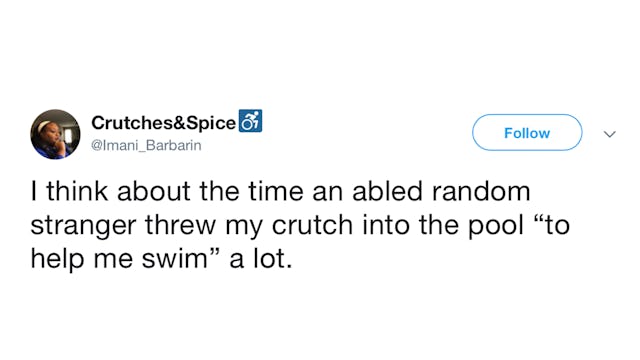#AbledsAreWeird Highlights How Able-Bodied People Treat People With Disabilities

People with disabilities took to Twitter to share all the strange ways that able-bodied people have treated them
There’s currently a trending hashtag labeled #ablesareweird and it highlights all the very strange, rude, and downright disrespectful ways that able-bodied people have treated people with disabilities. A lot of the encounters described below are…really something else.
It all started with @Imani_Barbarin’s tweet. “I think about the time an abled random stranger threw my crutch into the pool ‘to help me swim’ a lot,” she wrote, and tacked on #ablesareweird.
Her tweet racked up more than 8,000 likes, 1,300 retweets, and a whole lot of responses. She was far from alone when it came to wildly inappropriate encounters with able-bodied people. First of all, some noted that they can’t even go to the bathroom in peace. One woman literally crawled under the stall to try to help out.
Others recounted the many times that they were treated like children because of their disability. One particularly repulsive example: “I was in a gov office yesterday & my mum (who is my carer) was helping me with paperwork, proof of ID, etc & the man serving us made jokes about me ‘being a mummy’s girl & child,'” Twitter user @Montanalsabella wrote. “When i got back in my wheelchair he said in a baby voice ‘are you spoon fed too?’ #AbledsAreWeird.”
According to the Center for Disability Rights, “ableism” is defined as is “a set of beliefs or practices that devalue and discriminate against people with physical, intellectual, or psychiatric disabilities and often rests on the assumption that disabled people need to be ‘fixed’ in one form or the other.”
Ableism is intertwined in our culture, due to many limiting beliefs about what disability does or does not mean, how able-bodied people learn to treat people with disabilities and how we are often not included at the table for key decisions. Ableism often begins with good intentions but can have dangerous and hurtful consequences.
https://twitter.com/jetpack/status/1106791183580348417
Or called people with disabilities an “inspiration.”
Then there were the incidences when able-bodied people didn’t understand that not all disabilities can be seen. “All those times that people try to guilt trip me into giving up my seat in the bus/metro because ‘i don’t look disabled’ while i literally cant stand for more than 7 minutes because my legs will give out on me,” Twitter user @jjklovebots wrote. “#AbledsAreWeird.”
Or thought that someone was “too pretty” to need a face mask to breathe outside.
And then there’s just the complete, complete lack of common sense.
There’s also the people who don’t quite understand that disabilities just magically go away.
https://twitter.com/jetpack/status/1106931463621099520
Twitter user @twitchyspoonie summed up all these awful, baffling stories by explaining that this is indeed a universal experience. “I feel like you can never fully guess how ridiculous people are unless you’re disabled, especially if your disability is visible. Like, I don’t know any disabled person without a crapload of stories of people behaving absurdly.”
This article was originally published on